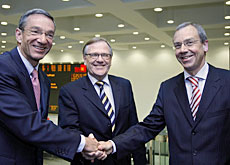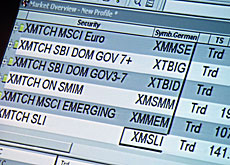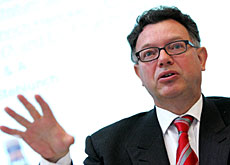Swiss bourse prepares to defend itself

Switzerland's SWX stock exchange operator has rubber-stamped its merger with two clearing and settlement groups to create Swiss Financial Market Services.
The move is aimed at boosting Switzerland’s appeal as a global financial centre and comes as foreign bourses join forces in response to shareholder demands.
The unlisted group, owned by Swiss banks, said it had appointed Urs Rüegsegger as its group chief executive. He had previously been the head of St Gallen cantonal bank.
Peter Gomez, who was previously SWX’s chairman, would become the chairman of the new group, which combines the businesses of SWX, SIS Group – a clearing company – and Telekurs, a data services provider. It will be up and running at the start of next year.
The merger creates what experts call a vertical “silo”, offering clients trading, payment and settlement services under one roof. It is also expected to cut costs and streamline service.
“The objective of the merger is to enhance efficiency and innovation as well as to strengthen the competitiveness of the Swiss financial centre,” the three companies said in a joint statement.
Independent
SWX said last November it wanted to stay independent and avoid the ongoing round of bourse consolidation. It added that it would look for partnerships to boost its business like the ones it already has with Deutsche Börse.
The new structure is sometimes seen as a defensive move against any takeovers, as the world’s stock exchange operators have started merging in recent years, with clients clamouring for lower transaction costs.
Changes in European financial market regulations from November 1 will allow banks and other institutions to set up their own trading platforms. Swiss banks Credit Suisse and UBS are part of an international consortium planning a new bourse called Project Turquoise.
They will also own more than 30 per cent of the new Swiss group between them, but Gomez told swissinfo that there would be no conflict of interest, adding that the Swiss market is now well positioned to fend off such a challenge.
“Credit Suisse and UBS brought themselves into this venture [Swiss Financial Market Services] in such a way that demonstrates their commitment to the Swiss financial centre,” he said. “But if we are not competitive then they might move along and go with Turquoise,” he said.
“The question is who are they going to attack with Turquoise? I think they will start with the London stock exchange or the Deutsche Börse and not Switzerland in the first instance.
Power redistributed
One hurdle to the merger until now had been some bankers’ perception that UBS and Credit Suisse wanted to dominate the securities business. They control both SIS and Telekurs.
At SWX Group, where each of the 47 members carry equal weight, they only have one seat each on the board. Under the new structure, the two banks will control 31.1 per cent of the shareholding and get two seats compared with one allocated to each of the other owner groups.
Gomez defended the reallocation of power, pointing out that while the two big banks will gain more influence than with SWX they will also give up some control of SIS and Telekurs.
“This is quite a fair deal. The big banks have two board members out of ten so it is not possible for them to dominate the decision making,” he told swissinfo.
swissinfo, Matthew Allen in Zurich
The new Swiss Financial Market Services group will have 160 user-owners (institutions that both take advantage of the group’s services and hold an ownership share).
Credit Suisse and UBS will have a 31.1% shareholding and two seats on the board.
The other owners are grouped together as commercial and asset management banks (19.5%, 1 seat), foreign banks (19.3% and 1 seat), cantonal banks (14.1%, 1 seat), private banks (10.5%, 1 seat) regional and Raiffeisen banks (4.3%, 1 seat) and other parties (1.3%, 0 seats).
SWX, SIS and Telekurs will still exist as subsidiary brand names within the new group.
Clearing: This represents a central setting-off of claims and liabilities.
Settlement: The term signifies the completion (booking) of securities transactions both on the securities and the money side.
SWX Group, with 430 employees, runs the Zurich stock exchange.
SIS Group, with a staff of 435, provides services international securities trading, clearing, settlement and custody.
Telekurs Group, which has 1,700 employees worldwide, facilitates card-based and electronic payments and provides international financial information.

In compliance with the JTI standards
More: SWI swissinfo.ch certified by the Journalism Trust Initiative












You can find an overview of ongoing debates with our journalists here . Please join us!
If you want to start a conversation about a topic raised in this article or want to report factual errors, email us at english@swissinfo.ch.